Thanksgiving is a word associated purely with the USA ‘ the marking of the Pilgrim Fathers bringing Christianity to the Americas. But how much of that is true? And how much is that based purely on much older harvest festival traditions of the countries that they came from? Here is a list of ten of the best-known and most celebrated thanksgiving festivals from around the world.
1. American Thanksgiving
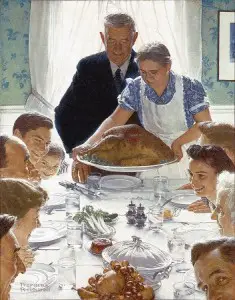
The most famous of them all really is a harvest festival. Celebrated on the fourth Thursday of November (and consequently rarely more than a month before Christmas). The original Thanksgiving was celebrated to mark the first harvest after the arrival of the Pilgrim Fathers in 1621. It lasted three days and Native Americans were in attendance at a time that relations were good. Later on, Abraham Lincoln marked it a Federal Holiday after the Civil War to ‘give thanks to our Father who dwelleth in the heavens’
2. Canadian Thanksgiving

Always the second Monday in October, it became a national holiday in 1957. Not all provinces have taken it up though, for the Atlantic coast settlements it is an optional holiday. It has far more in common with the Harvest Festival of the liturgical calendar than with the American version of the holiday (hence its much earlier date bringing it into line with Protestant church traditions). It also predates the American holiday by some 40 years or more. Frobisher’s crew offered thanks for their deliverance from the weather that plagued the trip
3. Harvest Festival ‘ Anglican, Methodist
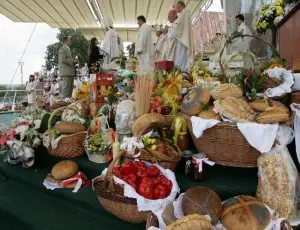
The Harvest Festival is considered a very British tradition dating to way before the dawn of Christianity in the country but adopted as part of the liturgical year. Starting out as Lammas (marked in August) it caught on quickly and had become a big part of the English Church by the 16th Century, possibly as one of the ways in which the new Protestant Church of England could set itself apart from the Catholic traditions it replaced. Today, the CofE and the Methodist Church use it to promote awareness of hunger in the Third World
4. Bonfire Night – Britain and the Commonwealth
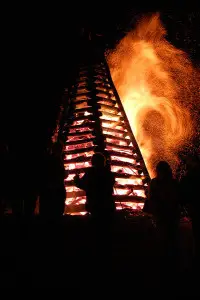
Remember remember the 5th of November’¦ Gunpowder Treason and Plot ‘ so goes the first line of the poem written to mark the failure of political and religious dissidents to overthrow King James I. Celebrants light bonfires and let off fireworks to note the failure of the Plot. Usually, an effigy of Guy Fawkes is burnt on the bonfire. In the UK, it is the last celebration or festival before Christmas. Candy floss, treacle toffee (otherwise called bonfire toffee) and toffee apples are enjoyed by adults and children alike.
5. Moon Festival ‘ China and Vietnam
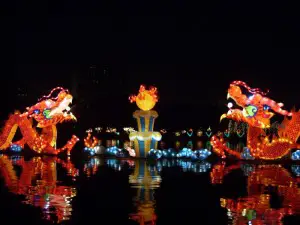
Most of the Thanksgiving festivals are around autumn ‘ the period of harvest – and this one from China and Vietnam is no exception. It is held on the 15th day of the eighth month in the Chinese Calendar which means in the Gregorian Calendar it will fall between very late September and very early October. It is counted amongst the most important of the cultural holidays in those two countries and in Taiwan. It is said that the festival has been celebrated for over 3000 years.
6. Sukkot (Feast of the Tabernacles) – Judaism

Another that falls in late September to early October, this Jewish biblical festival is one of three as mandated in the Old Testament that Hebrews should make a pilgrimage to the Temple in Jerusalem. It lasts for seven days in total. The first and last are a holiday when work is not just discouraged, but forbidden. A sukkah is traditionally constructed for the middle days (a walled structure covered in green leaves) and marks the Exodus and 40 years of wandering. The family will typically eat all meals inside the building.
7. Erntedankfest – Germany
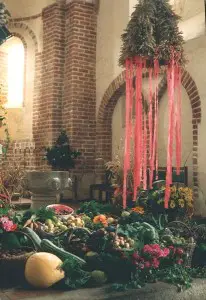
Very similar to the Anglican Harvest Festival, this German tradition also claims to have pagan roots. It signifies thanks to God for a bountiful harvest. Churches are decorated with fruit, grains and other local produce. The food is nearly always set aside for the poorest of society, struggling families and more commonly, the homeless. Like the British Harvest Festival, it too became more prominent as Germany sought to stamp a national outlook on the new Protestant traditions following the Reformation
8. Crop Over Festival – Barbados

One festival that has its roots purely in the colonial era of North America began in the Sugar Cane Plantations of Barbados. At first it was a feast and musical celebration to mark the end of the harvest of the sugar crop but later became (and remains today) a wider celebration of food, drink and music. Today it is similar to the Trinidad Carnival, lasts two months and includes art and craft markets, celebrating the best of local produce the island has to offer
9. Labour Thanksgiving Day – Japan
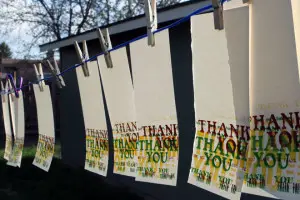
This is a national holiday in Japan, taking place every 23rd November. With such a focus on capitalism and Japan’s economy, this holiday is dedicated as an official state day off for labour and production and generally giving thanks. It started out partly as a harvest festival and partly for Emperor giving thanks to the Japanese people for the hard work of the year, tracing its roots back to around 2700 years ago. The modern festival though came into effect after WWII to celebrate the rebuilding of Japan
10. Mehregan – Iran
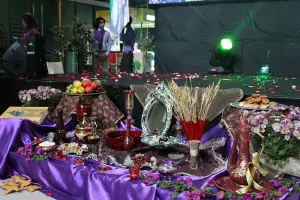
Those who think that Muslim countries do not honour their pagan pasts (or adopt pagan practices into Islam) are wrong- they are just as likely to do so as Christian countries as demonstrated from this carry over from when Iran followed the Zoroastrian religion. It honoured the pagan god of love ‘ Mehr. It too is an autumn harvest festival marked with family reunions, banquets, lots of fruit and traditional foods. Rosewater is the traditional drink of the period too
Conclusion
Most of the festivals above centre on autumn and specifically harvest festivals. Despite modern monotheistic global religions, it is likely that they all have their roots in a pagan past when settlements were anxious about a harvest and life meant the difference between a good and a failed harvest. In this global economy with intensive farming, it seems that old habits ‘ even when no longer relevant ‘ die hard










Leave a Reply